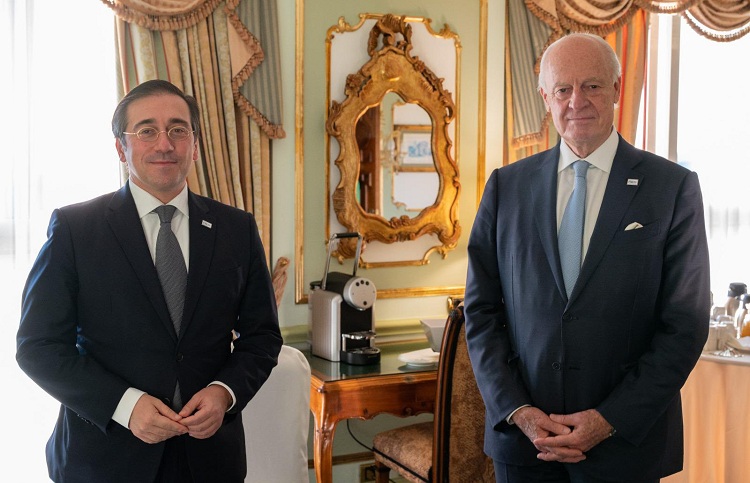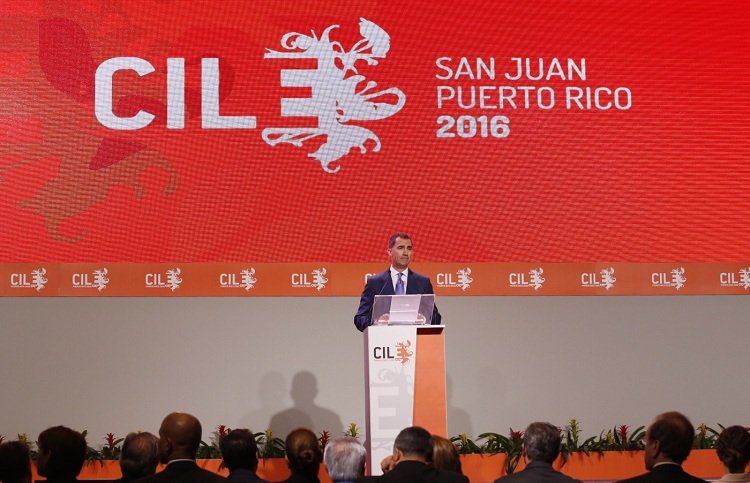Eduardo González
The Minister of Foreign Affairs, José Manuel Albares, received yesterday in Madrid the UN special envoy for Western Sahara, Staffan de Mistura, two days after the Moroccan government implied that, for there to be a reconciliation with Spain, our country should, at least, accept the Moroccan proposal of autonomy for the former Spanish province.
De Mistura arrived yesterday in Spain at the end of his first regional tour since his appointment in October, in which he visited Morocco, the Saharawi refugee camp of Tindouf, Mauritania and Algeria and met with the main actors and authorities of those countries. As a Foreign Ministry spokesman informed The Diplomat, Albares conveyed to the UN envoy the “full support of Spain” for his work, as he did at their first meeting in Rome last December. The special envoy made this tour aboard a plane that the Spanish Air Force has placed at his disposal.
During a breakfast briefing organized yesterday by the Europa Press agency, the minister avoided pronouncing himself on the recent declarations of the Prime Minister of Morocco, Aziz Akhnnouch, in which he implied that if Madrid wants to improve its relations with Rabat it should, at least, do the same as Germany, which has qualified the Moroccan proposal of autonomy for Western Sahara as “a good basis” to achieve peace in the area. Also, without expressly citing Spain, he pointed out that King Mohamed VI has been clear in his speeches and that “the Kingdom’s relations with other countries are based on loyalty and ambition”, which is true for “those who understand the question of the Moroccan Sahara and who support it”.
“I do not want to minimize these statements”, but Akhnnouch “did not speak at any time of Spain, it was a journalist who did so”, Albares affirmed. Instead, he continued, “the words of King Mohamed VI last August were very clear about the type of relationship he wants with Spain.” Last August 20, the Moroccan monarch expressed his desire to continue working with Spain in order to “inaugurate a new unprecedented stage” in the bilateral relationship based on “trust, transparency, mutual consideration and respect for commitments”.
Those same words, according to Albares, have been “endorsed” by the President of the Government, Pedro Sánchez, and by King Philip VI, who last Monday used his speech at the traditional reception for the Diplomatic Corps accredited in Madrid to urge Morocco to “materialize now” a new bilateral relationship based on “stronger and more solid pillars”. Among those attending the ceremony was the Moroccan Chargé d’Affaires in Madrid, but not the ambassador, Karima Benyaich, who was recalled for consultations by her government on May 18, in the midst of the diplomatic crisis over the reception in a Spanish hospital, for humanitarian reasons, of the leader of the Polisario Front, Brahim Ghali. “I would like the ambassador to return, but it does not depend on me”, affirmed yesterday the minister, who recognized that his agenda does not yet include a visit to Morocco.
Sahara: “We have a moral obligation to put an end to the conflict”
Regarding Western Sahara and Rabat’s request to accept the autonomy proposal, Albares assured that Spain’s objective is “to find a solution to a conflict that lasts decades and that, more than frozen, is forgotten”. “In the end they are human lives, thousands of people without any hope” and, for this reason, Spain has the “moral imperative” to help put an end to the conflict.
“What Spain wants is to unblock the conflict,” but it cannot “speak on behalf of the parties,” he warned. “We want a mutually acceptable political solution for the parties, and in the UN framework there are resolutions that offer hints of serious and credible efforts, but it is the parties that have to talk,” he added. Last Monday, Albares and the US Secretary of State, Antony Blinken, agreed in Washington “to join forces to resolve a conflict that has already lasted too long”, according to the minister. The decision of the former US president, Donald Trump, to recognize Moroccan sovereignty over the Saharawi territory was one of the main triggers of the serious diplomatic crisis between Rabat and Madrid.







